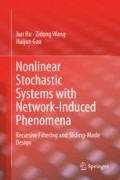Abstract
In this chapter, the recursive filtering problem is firstly investigated for a class of discrete-time non-linear stochastic systems with random parameter matrices, multiple fading measurements, and correlated noises. The phenomenon of measurement fading occurs in a random way and the fading probability for each sensor is governed by an individual random variable obeying a certain probability distribution over the known interval. The purpose of the addressed filtering problem is to design an unbiased, recursive, and optimal filter in the minimum variance sense. Intensive stochastic analysis is carried out to obtain the filter gain characterized by the solution to a recursive matrix equation. Based on the proposed filter approach, the gain-constrained recursive filtering problem is studied for a class of non-linear time-varying stochastic systems with probabilistic sensor delays and correlated noises. A new recursive filtering algorithm is developed that ensures both the local optimality and the unbiasedness of the designed filter at each sampling instant which achieving the prespecified filter gain constraint.
Access this chapter
Tax calculation will be finalised at checkout
Purchases are for personal use only
References
Luo Y, Zhu Y, Luo D, Zhou J, Song E, Wang D (2008) Globally optimal multisensor distributed random parameter matrices Kalman filtering fusion with applications. Sensors 8(12):8086–8103
Jacobson DH (1974) A general result in stochastic optimal control of nonlinear discrete-time systems with quadratic performance criteria. J Math Anal Appl 47(1):153–161
Yaz EE (2001) State estimation of uncertain nonlinear stochastic systems with general criteria. Appl Math Lett 14(5):605–610
Yang F, Wang Z, Ho DWC (2006) Robust mixed \(H_{2}/H_{\infty }\) control for a class of nonlinear stochastic systems. IEE Proc Control Theor Appl 153(2):175–184
Feng J, Wang Z, Zeng M (2011) Optimal robust non-fragile Kalman-type recursive filtering with finite-step autocorrelated noises and multiple packet dropouts. Aerosp SciTechnol 15(6):486–494
Horn RA, Johnson CR (1991) Topic in matrix analysis. Cambridge University Press, New York
Caballero-Águila R, Hermoso-Carazo A, Jiménez-López JD, Linares-Pérez J, Nakamori S (2010) Signal estimation with multiple delayed sensors using covariance information. Digit Signal Process 20(2):528–540
Liou LW, Ray A (1991) A stochastic regulator for integrated communication and control systems: part I-formulation of control law. ASME J Dyn Syst, Measur Control 113(4):604–611
Nakamori S, Caballero-Águila R, Hermoso-Carazo A, Linares-Pérez J (2005) Recursive estimators of signals from measurements with stochastic delays using covariance information. Appl Math Comput 162(1):65–79
Ray A (1987) Performance evaluation of medium access control protocols for distributed digital avionics. ASME J Dyn Syst, Measur Control 109(4):370–377
Teixeira B, Chandrasekar J, Palanthandalam-Madapusi HJ, Tôrres LAB, Aguirre LA, Bernstein DS (2008) Gain-constrained Kalman filtering for linear and nonlinear systems. IEEE Trans Signal Process 56(9):4113–4123
Kolås S, Foss BA, Schei TS (2009) Constrained nonlinear state estimation based on the UKF approach. Comput Chem Eng 33(8):1386–1401
Yang C, Blasch E (2006) Kalman filtering with nonlinear state constraints. In: Proceeding of the 9th International conference on information Fusion, Florence, pp 1–8
Simon D (2006) Optimal state estimation: Kalman, \(H_\infty \), and nonlinear approaches. John Wiley & Sons
Ma J, Sun S (2011) Optimal linear estimators for systems with random sensor delays, multiple packet dropouts and uncertain observations. IEEE Trans Signal Process 59(11):5181–5192
Wang F, Balakrishnan V (2002) Robust Kalman filters for linear time-varying systems with stochastic parametric uncertainties. IEEE Trans Signal Process 50(4):803–813
Author information
Authors and Affiliations
Corresponding author
Rights and permissions
Copyright information
© 2015 Springer International Publishing Switzerland
About this chapter
Cite this chapter
Hu, J., Wang, Z., Gao, H. (2015). Recursive Filtering with Fading Measurements, Sensor Delays, and Correlated Noises. In: Nonlinear Stochastic Systems with Network-Induced Phenomena. Springer, Cham. https://doi.org/10.1007/978-3-319-08711-5_3
Download citation
DOI: https://doi.org/10.1007/978-3-319-08711-5_3
Published:
Publisher Name: Springer, Cham
Print ISBN: 978-3-319-08710-8
Online ISBN: 978-3-319-08711-5
eBook Packages: EngineeringEngineering (R0)

